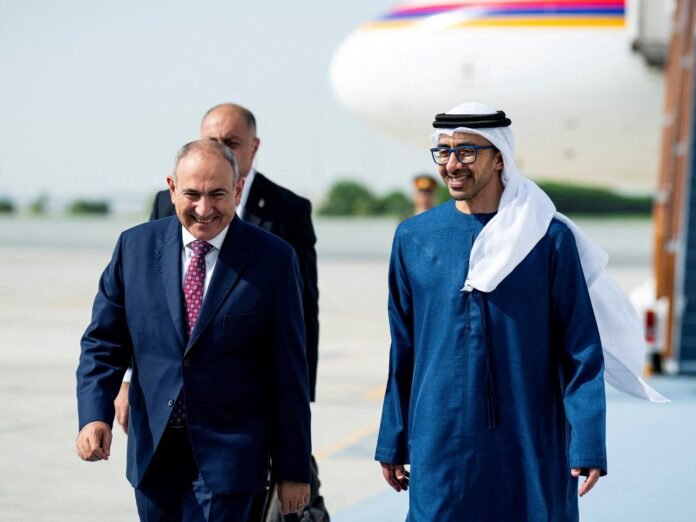Draft deal to end decades-long conflict agreed four months ago, but timeline for sealing it remains uncertain.
The leaders of Armenia and Azerbaijan have held peace talks in the United Arab Emirates after nearly four decades of conflict, but no hoped-for breakthrough has been announced.
The meeting in Abu Dhabi on Thursday between Armenian Prime Minister Nikol Pashinyan and Azerbaijani President Ilham Aliyev came after the two countries finalised a draft peace deal in March.
There was no sign of any concrete progress in the final statement released separately by the two countries’ foreign ministries, which noted the two leaders “agreed to continue bilateral negotiations and confidence-building measures between the two countries”.
“It was confirmed that bilateral negotiations represent the most efficient format to address all issues concerning the normalisation process, and on this basis, it was agreed to continue such result-oriented dialogue” and the delimitation of the shared border, it added.
The South Caucasus countries have fought a series of wars since the late 1980s when Nagorno-Karabakh, a region in Azerbaijan that had a mostly ethnic Armenian population at the time, broke away from Azerbaijan with support from Armenia.
Peace talks began after Azerbaijan recaptured Nagorno-Karabakh in a lightning offensive in September 2023, prompting an exodus of almost all of the territory’s 100,000 Armenians, who fled to Armenia.
A key stumbling block to a deal remains as Azerbaijan demands Armenia change its constitution, which it says makes implicit claims to Azerbaijani territory.
Yerevan denies this, but Pashinyan has repeatedly stressed in recent months – most recently this week – that his country’s founding charter needs to be updated.
Azerbaijan also asked for a transport corridor through Armenia to link the bulk of its territory to Nakhchivan, an Azerbaijani enclave that borders Baku’s ally Turkiye.
Pashinyan and Aliyev’s last encounter was in May on the sidelines of the European Political Community summit in Tirana, Albania.
In June, Pashinyan made a rare visit to Istanbul to hold talks with Turkish President Recep Tayyip Erdogan, a meeting Armenia described as a “historic” step towards regional peace.
This week, United States Secretary of State Marco Rubio expressed hope for a swift peace deal between the neighbours.
The outbreak of hostilities between the two countries in the late 1980s prompted mass expulsions of hundreds of thousands of mostly Muslim Azeris from Armenia and Armenians, who are majority Christian, from Azerbaijan.

